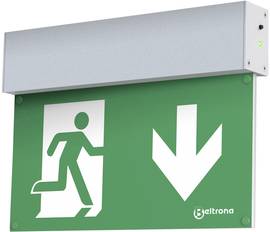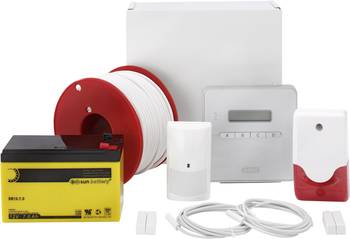All products
Current offers
Security weeks - innovative solutions for every area
Security is an investment that pays off. With modern security technology, you can protect your company, your employees and your customers against burglary, theft, vandalism and other risks. Whether alarm systems, video surveillance, fire alarm systems or occupational safety equipment such as gloves or hearing protection - we have the right solution for your individual requirements.
Guide
This text is machine translated.
Strict safety requirements apply in the commercial sector, as the protection of life and property has a high priority in the company. It is also important to eliminate the risk of malfunctions and breakdowns that could impair operational processes. Effective protection is particularly important for companies with valuable business equipment.
Concrete dangers for industrial, commercial and trade businesses are omnipresent and range from break-ins and robberies to fires, burst pipes and gas leaks to vandalism. Burglars often choose commercial properties as a lucrative target. Computers, notebooks, office equipment, machines, goods and expensive spare parts are believed to be in office, production and storage rooms. The loss of business equipment has serious economic consequences for the company concerned.
Effective technical protection for offices, company buildings and facilities starts with preventive burglary protection. This includes all measures that make it difficult for unauthorized persons to break in. Securing your business with mechanical and electronic security technology is often comparatively easy to implement and can prevent the most damage. According to the police, burglars repeatedly fail to use sophisticated security technology, especially in the commercial sector. It is therefore worth doing something about burglary protection and the security of your building.
The security technology used is as diverse as the potential hazards. Ideally, an advanced security concept for your company will utilize the entire range of possibilities offered by modern security technology. It takes into account all relevant sources of danger, thereby protecting the company's existence and pays off for companies of all sizes.
You determine which security technology you specifically need as part of a risk and vulnerability analysis. The result is a security concept that identifies the individual risks and industry-specific requirements for your business.
Mechanical security systems on doors, windows and gates prevent unauthorized access from outside. The mechanics on the door or window form a physical barrier. Alarm systems deter perpetrators so that, ideally, a break-in does not occur at all. If it does happen, the systems alert security companies or the police.
Break-ins are not the only situations in which electronic systems provide protection. Hazard alarm control panels cover the entire spectrum of hazard alarm technology. The modular systems use sensors to detect not only break-ins but also fire, smoke, heat, gas leaks, water leaks or sudden changes in temperature. Employees can trigger the system manually via alarm devices and emergency buttons in the building.
Risk management for commercial and industrial buildings is also highly relevant in terms of insurance law. Although you are not legally obliged to implement mechanical and electronic security measures, insurers impose clear conditions. Without the right security technology for effective risk prevention, there is often no insurance cover. Ultimately, it should be in your own interest to protect your company or business.
Many property insurers only cover damage caused by burglary and vandalism if the business complies with the VdS loss prevention guidelines. The guidelines define the technical security requirements, taking into account the risk to an insured property. The manufacturers of certified security technology generally state which VdS security classes their products support.
Good to know: To effectively minimize damage, VdS Schadenverhütung, Europe's largest institute for corporate security, recommends supplementing mechanical security measures with electronic monitoring measures. In this way, break-ins can be detected as quickly as possible and suitable intervention measures can be initiated at an early stage.
The most important mechanical security systems include solutions for door and window protection. Locking systems, locking systems and locking cylinders, access control systems, code locks, intercom systems and door viewers are available for burglary protection. The secure storage of valuables, documents and keys in safes and cabinets is also included.
The marking of escape and rescue routes is an important issue. Safety and emergency lights, escape route signs and escape signs show the way out or to first aid facilities in dangerous situations.
Mechanical solutions are also available for the protection of employees and people in the company, for example respiratory masks, safety goggles, hard hats and fire extinguishers.
Hazard detectors are warning devices equipped with sensors that are used in connection with liquid or gaseous media: Water, gas, fire and smoke detectors. There are also power failure detectors, temperature monitors and brightness detectors.
In many cases, the basic functionality of hazard detectors is based on sensors that monitor an area for which preset parameters apply. If a parameter is exceeded or undershot, the electronics behind it emit a signal that triggers further processes. Possible actions include triggering sirens and signal lights or switching off a system. Hazard detectors are available as stand-alone models, for connection to an alarm or hazard detection control panel and in networked versions.
Alarm systems, burglar alarm control panels, fire alarm systems and hazard detection systems monitor the individual hazard detectors. The user controls and manages the entire security technology conveniently via control panels, a browser or an app on a smartphone. Remote access to the hazard alarm system allows continuous monitoring and simplifies maintenance.
The systems are available in numerous versions, from starter packages for smaller properties to complex security technology for comprehensive building security. In terms of the technical approach, a distinction is made between wired alarm systems and those based on wireless technology.
Radio systems work wirelessly with encrypted data transmission on a protected frequency band. Wireless operation simplifies installation and keeps the costs for installation and subsequent extensions low.
The installation of surveillance cameras and video surveillance systems improves security. The devices provide a round-the-clock view around the company building and into your premises. Potential burglars are deterred by video surveillance and crimes are thwarted in advance.
In an emergency, the cameras contribute to a rapid risk analysis. Critical situations can be checked from a safe distance using the camera images on the monitor. After an incident, the video recording helps to assess what happened.
Benefit from networked electronic security technology
More and more products in the areas of safety and fire protection are smart. The networking of security sensors opens up new application possibilities, added value and potential savings. For example, a magnetic contact on a door or a motion sensor in passageways can not only activate an activated alarm system, but also switch the lighting or regulate the heat output of the heating. In combination with building automation and smart homes, the components of security systems and intruder alarm systems contribute to the energy efficiency of your business. Other smart control functions around the house include roller shutters, blinds, garage doors and ventilation systems.

